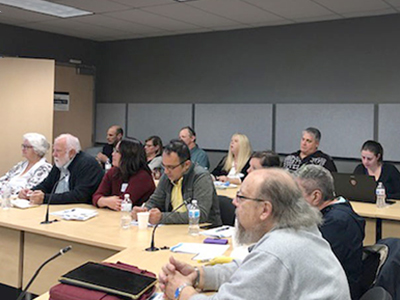
Members of a community stakeholder committee experienced a deeper sense of connection while supporting airway disease care and prevention.
Living with a respiratory illness is challenging at the best of times, and particularly fraught as the highly contagious COVID-19 respiratory infection continues to spread in waves around the globe. To better understand patients’ needs, Vancouver Coastal Health Research Institute (VCHRI) researcher Dr. Christopher Carlsten and a cross-disciplinary team of collaborators published a study — in the journal Chest — on a novel group that is helping advance research to forestall and care for respiratory illness.
“We wanted to test how patient partners could themselves evaluate initiatives to improve the lives of people with respiratory illness with the aim to document and optimize best practices.”
“We recognized that patient involvement in research is the gold standard,” says Carlsten. “Past literature has shown that it can not only contribute meaningful insights and questions to steer the direction of research investigations, but can also uncover potential gaps in prevention, care and unmet patient needs.”

Carlsten and colleagues co-created and developed a Community Partner Committee (CPC) in late 2019 composed of up to 20 individuals of different ages, ethnicities, fields of employment, gender, education and disease severity. All CPC members were living with or susceptible to one of the two most common chronic lung diseases: asthma or chronic obstructive pulmonary disease (COPD).

Study collaborators included members of the Legacy for Airway Health (LAH) initiative, a coalition of patient partners, researchers, clinicians and leaders. LAH is designed to support research that can more efficiently be transitioned into novel preventive interventions, treatments and patient care, including efforts to move lab-based work into clinical practice.
The team encouraged CPC members to engage in all parts of the research process to find new preventative and curative treatments for asthma and COPD: from conceptualization through to knowledge synthesis, dissemination and implementation, notes Carlsten.
“The CPC is potentially the first patient group to support meaningful engagement in respiratory health research in depth and on an ongoing basis.”
“Group member learnings from external activities, such as online COPD support groups and initiatives for lung transplant patients, were relayed back to the CPC,” he adds.
From patient partners to knowledge translators
CPC members met in person until the announcement of the COVID-19 pandemic in March 2020 necessitated a move to a virtual platform.
“We initiated check-ins after the transition to virtual meetings to get a sense of member needs during this challenging and often frightening time for people with preexisting respiratory disease,” says Carlsten.

Photo courtesy of the Legacy for Airway Health
At around the one-year mark, Carlsten’s team surveyed CPC members using the Patient Engagement in Research Scale to assess members’ perceptions of the meaningfulness of the engagement they experienced participating in the CPC, and establish baseline data for future annual evaluations.
Survey results indicated that CPC members felt valued and supported throughout the study. Their feedback also highlighted the importance of having opportunities to learn, grow and improve their knowledge of their own condition by participating in the group.
One participant noted: “I feel that I am not alone… we are walking the same path.”
Participants gave a lower score to the quality of the interaction during group sessions, which Carlsten believes reflects the challenges of hosting meetings in an online environment. “More work is likely needed to improve the ease of use of technology and how we engage with participants moving forward,” he notes.
“There is a lot of momentum behind patient participation in research,” says Carlsten. “I hope other investigators will see this study and recognize the importance of involving patients in research.”


